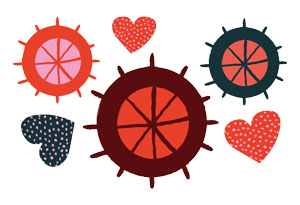Food and mood: The chicken or the egg?

Both my Facebook and Instagram feeds are obsessed with what you put in your mouth. A Sunday roast. A raw vegan slaw. Another avocado smashed onto toast. Clean, Paleo, Ayurvedic, chef boxes, coconut oil: we’re obsessed with what we are eating.
Still there’s a massive upsurge in digestive maladies and intolerances. This leaves me to wonder: Maybe it’s not just about what we’re eating… but what’s eating us? Ancient yogis said that ‘everything is food’ and it’s our ability to digest something that separates what’s nourishing from what’s toxic.
So what of the fact that between 10 and 20% of the public suffer from Irritable Bowel Syndrome (IBS) in the UK at any given time? It was widely reported last year that the NHS dispenses more than four million prescriptions for antacids every year, at a cost of more than £26 million.
One IBS sufferer, we’ll call him ‘Ted’, tried antacids, every dietary detox he could find and changed his food choices because, like many, he was having problems with his digestion.
Finally, he went to see his GP for some meds. He was told he had IBS. It didn’t shift.
Ted showed up on a yoga mat with his gut in a knot. The unexplained, intense pains had begun four months earlier. His bowel would go liquid at times. Other days, the reverse. Bad digestion, bloating appetite. Up, then down.
Ted went for a yoga therapy session hoping some poses might ‘fix it’.
He started to do some deep belly breathing – and soon tears were flowing. An image came up as he released the tension in his lower abdomen – it was of his girlfriend of two years shouting at him in the street the week before.
This wasn’t the first time Mary’s reaction had been extreme, but the incidents had built up slowly. It wasn’t until he literally stopped and listened to his gut that the source of his digestive trouble started to become clear. The penny dropped. This is what the GP had meant by ‘stress’ causing his difficulties.
AND RELAX…
Ted’s symptoms may seem extreme, but they are certainly not uncommon. Some suggest our digestive malaise is down to eating too fast; others blame fast foods and intolerances to hard-to-process ingredients, such as gluten or lactose. But why are foods that were once innocuous now seemingly toxic? Ted’s experience suggests it isn’t just our food.
While the substances we consume and foods we eat certainly have a direct impact on our gut, there is evidence to suggest that an overwhelming increase in the ‘stress response’ in modern life bears a large part of the blame.
We may not feel particularly stressed, but consider first that our breathing rate is directly linked to our heart rate and that the heart rate indicates calm or agitation.
In the 1920s, anatomy texts cited that the average adult took about eight to 10 breaths per minute, but today even the most relaxed of us takes around 12 breaths per minute and that range rises to 25 for the highly strung corporate raider.
Essentially, our breathing is faster and our nervous systems are in a heightened state of low-grade fight-or-flight. It’s no wonder that anxiety, insomnia and gut-related illnesses are on the increase. So, what do we do about it?
THE BREATH OF LIFE
In search of an answer, I lay on a yoga mat being led into a meditative state by Ben Wolff, a yoga nidra teacher at the Life Centre in London. Ben walks around with a tiny machine that looks like a Bluetooth earpiece attached to his shirt collar.
It emits a beep, which prompts Ben and his class to breathe in and, five seconds later, another beep to tell them to breathe out. It’s called Coherent Breathing, and was pioneered by Dr Richard Brown and Dr Patricia Gerbarg.
We follow the beep, breathing together at six breaths per minute – five seconds in, five seconds out. First time, I find it initially a bit of a strain, then fall asleep, and finally wake to follow the beeps easily.
After 45 minutes, I wipe a rather fetching bit of drool from the corner of my mouth, and rise from the floor and out into the night.
I later meet a friend for a drink and am told I’m positively glowing. I’m given a slightly suspicious look and am asked what I’ve been up to. My nervous system has powered-down: I’ve been in rest-and-digest mode.
I’ve experienced what Harvard Medical doctor Herbert Benson termed the ‘Relaxation Response’ – the complex and rather delicious neuro-physiologial effects of being in a meditative state.
When the relaxation response kicks in, apparently, a lot of fun and funky things happen. The body stops thinking it’s subtly under threat, the skeletal muscles relax, blood flow returns to the limbs, we can experience and maintain sexual arousal and, importantly for our discussion here, we can break down and absorb our food. The gut calms.
This is the first ingredient Ted was missing and why his gut could finally speak its mind when he amped-down his stress response. And the reason for my drool. According to Wolff, a dry mouth is a result of a stressed nervous system.
MOOD AND FOOD
As we all know, food and mood are rather like the old chicken-and-egg problem.
When we’re in a lousy mood, we crave the very things that undermine our health but research shows that when we calm down the nervous system, we eat the right things and the good stuff is absorbed, digested and made into good brain chemistry, meaning we can reverse-engineer the stress response in the longer term.
As it turns out, taking anti-depressants can’t actually make the wellbeing and happiness neurotransmitter serotonin, it can just keep it around for longer.
But if we eat foods that can help our bodies to create serotonin for itself and can digest and absorb their brain-boosting nutrients, then we are on the way to feeling a whole lot better, from the gut up.
Joan Mathews Larson’s classic 2001 book Depression Free, Naturally (£12.42, Wellspring/ Ballantine) is a revelation, albeit with something of a misleading title.
It focuses on dietary supplements such as amino acids, tryptophan (the parent of serotonin), Vitamin C, B vitamins and Omega oils and their direct impact on everything from recovering from addiction to re-establishing our ever-diminishing attention span. It’s a must-read for anyone wanting to heal rumbly tummies and grinding guts.
READER’S DIGEST
While the first key to healing the gut may be the body-mind connection, there are other tiny bodies to consider: bacteria.
Without the right bacterial composition in the gut, we can easily dispose of our food before extracting its nutrients, thus nothing good gets through.
In her clever and funny book Gut (£8.99, Scribe UK), German writer and scientist Giulia Enders mentions a 2013 study that found four weeks of taking a certain ‘bacteria cocktail’ led to real changes to the areas of the brain involved in processing emotions and pain.
Recently, a one-two gut punch of a sudden bereavement and a break-up, and a whole lot more, led to my being distinctly off-mojo
with clear evidence (which I won’t go into here) that my gut balance was off kilter.
I got hold of a high-intensity probiotic shot and took the tasty bacteria cocktail on an empty stomach as directed.
Apparently the shot-approach bypasses the stomach acid that is the primary killer of good bacteria as it passes through digestion. Mostly, we want this acid to kill bacteria because it protects us from the bad ‘uns.
But, much like the distinctly horrible Montezuma’s revenge I contracted in Mexico at the age of 14, good bacteria also bypasses our defences in water.
It worked, and I started feeling the effects on my mood, junk food cravings diminished, my depressed gut was distinctly quiet and my energy rose. In addition, I felt more emotionally resilient again.
The bacteria made it through my defences and started restoring balance.
BRAIN ACHE
There are other more subtle defences, however, that may be warping our collective guts. This brings us back to the yogic idea that ‘everything is food’ but we can’t always digest it.
Essentially, our systems for digestion may be tripped up by being in fight or flight mode, and our fast paced information-rich environment leaves behind too much undigested psychological material.
What Dr Rick Hanson, author of Hardwiring Happiness (£9.99, Rider) calls the Negativity Bias, doesn’t help.
The human brain is trained to protect us, to perceive threat more prominently than positive cues. When we feel under threat, our bodies are programmed to increase stress hormones and shut down digestion.
So perhaps we need not only look at what we are eating and how, but ways to slow down our fast modern breath, find Dr Benson’s Relaxation Response, and start digesting on every level.
Five tips to heal your guts
1: FEEL THE LOVE
Build your relaxation response to soothe a rocky tummy. Use a targeted programme like thebellylovemethod.com, do restorative yoga or yoga nidra.
2: GET A GOOD SHOT IN THE GUT
Sip waterborne priobiotics or a milk drink with authentic live kefir cultures to get gut-brain resilience right up.
3: SPILL IT!
Emotions can sock you in the gut. Training centres like CCPE or online referrals at Welldoing, can find you a sympathetic therapist.
4: USE THE FOD MAP
Consult your GP or specialist about a diet low in FODMAPs (fermentable sugars) or cut sugars, caffeine and alcohol to feel your digestion, energy and mood improve.
5: GET COHERENT
Using a coherent breath app on your phone to remind you to breath in and out at a slower rate, which will help calm both your nerves and your tummy.









